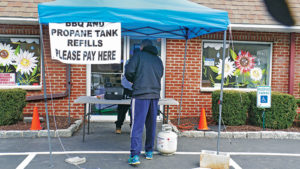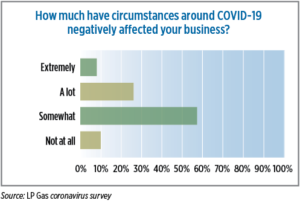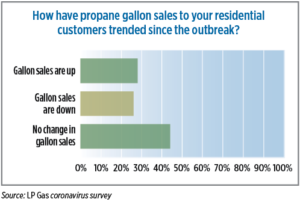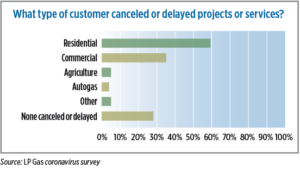Propane retailer responses to COVID-19 captured in new survey
Faced with the unknown impacts of a pandemic and graced with an essential business designation by the federal government, propane retailers continued to perform the true nature of their work: They delivered.
The World Health Organization declared COVID-19 a pandemic on March 11, in the waning stages of the winter heating season. LP Gas sought to measure the impact to retail propane businesses with reader surveys April 3 and April 9, which drew nearly 200 collective responses.
“I have been so impressed with how propane marketers are handling this across the country,” Tucker Perkins, president and CEO of the Propane Education & Research Council (PERC), said during PERC’s virtual meeting April 9. “Everybody seems to be very aligned and balanced in the safety for their employees and providing critical service to their customers.”
Safety measures
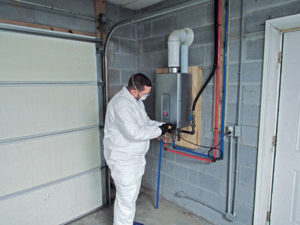
Many retailers are choosing to restrict employees’ access to customers’ homes to emergency situations and essential needs. Photo courtesy of Blossman Gas
The decision by retailers to close their doors to the public, as well as limit service calls at customers’ homes to emergencies, was among the responses aimed at keeping employees and customers safe during the pandemic. Deciding if, when and how to enter a customer’s home became a common concern from the outset of the outbreak.
“We have taken steps to protect our employees in an out-of-gas situation that would involve going in a home,” one retailer respondent says. “This includes asking questions regarding if they have anyone in their household who has tested positive for the virus [or has] been exposed to someone who has tested positive and is in self-quarantine.”
“Extra cleaning” was the most prevalent response (83 percent) by retailers when asked in the LP Gas survey about what steps they have taken to ensure worker health and safety during the outbreak. Retailer comments focused on hand washing and cleaning offices and vehicles regularly.
Retailers were supplying field employees with personal protective equipment – including face shields, masks, nitrile gloves, coveralls and boot covers – and getting help at the national level. The National Propane Gas Association worked with the Federal Emergency Management Agency to ship more than 57,000 cloth masks to more than 1,200 propane industry locations, President and CEO Steve Kaminski reported in mid-April.
Technology has played a key role for propane companies and their customers during the pandemic. About half of retailer respondents took to social media to communicate their plans to the public regarding COVID-19, while 40 percent shared messages on their websites.
In addition, more than half of retailer respondents were allowing employees to work remotely, leading companies to hold more video meetings. Some drivers were working from their homes and traveling directly to customer locations, utilizing delivery software and communicating as necessary with the office staff.
Companies further addressing social distancing protocols were requesting that customers pay their bills online, by phone or through the mail to limit foot traffic in the office.
Retailers allowing customers on-site installed new measures, including barriers between office personnel and customers; having customers wait in their cars for service inquiries; or erecting tents outside of the office for customer bill pay and tank fills.
Employees still working in the office were directed to social distance. Some companies staggered areas for employees to check in and out, while others took measures to separate the entire workforce and lessen the risk of exposure.
“We are allowing alternating days for our office staff to work from home,” one retailer respondent says. “We are rotating days that our drivers work so as to have as few employees in contact as possible.”
Not every company escaped unscathed. One retailer was forced to weather a COVID-19 exposure that forced the president to idle employees – except for a “skeleton crew” – for two weeks. Another company asked an employee to self-quarantine after vacationing outside the state.
Not lost on retailers was another concern: That their customers’ needs were still being met.
“We are an energy source that helps operate a home or essential business, and the customer will expect that service to continue,” one retailer says.
By the gallon
Since the coronavirus outbreak, about 45 percent of retailer respondents in early April had not experienced a change in propane gallon sales to their residential customers. Residential sales comprise the industry’s largest market segment at 55.6 percent, according to the latest Annual Retail Propane Sales Report (2018) from ICF and PERC. Those retailers who responded with an increase (28 percent) or decrease (26 percent) in gallon sales were nearly equal.
Retailers report some customers who were concerned about interruptions to their propane supply chain engaged in “panic buying,” while other retailers attributed a rise in gallon sales to more customers spending time at home during states’ shelter-in-place orders. A small percentage of retailer respondents (8.5 percent) in the LP Gas survey were providing propane for an application or customer directly tied to a coronavirus response in their communities, though social media showed examples of companies, including AmeriGas, Ferrellgas and Suburban Propane, fueling temporary COVID-19 testing tents.
Retailers associated any gallon sales declines during the first part of the pandemic with the commercial sector, particularly the closing of nonessential businesses and restaurants. In addition, school closings strained autogas sales to the districts running more than 20,000 buses nationwide on LPG.
Any change in residential gallon sales at the time could also have been attributed to the weather, retailers shared in their comments. The regional nature of the propane industry could mean cooler temperatures in one area of the country (“This is weather related – late-season cold snap,” one retailer says) and warmer temperatures elsewhere (“Spring is here, and gallons normally drop off,” another says).
“If I look on the bright side, I am sure thankful the winter was just about over when the COVID started. We are really thankful for that,” says Karen Baker, president of Red Baker Propane, located outside Oklahoma City. “What a nightmare had it been in the dead of winter.”
Business operations
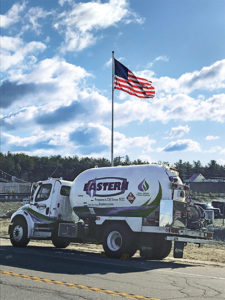
Some retailers attributed an increase in residential sales to more customers spending time at home under shelter-in-place orders. Photo by Richard Hauck/Eastern Propane & Oil
COVID-19 has left its mark on businesses around the world, and the propane industry was no exception. In early April, only about 10 percent of propane retailer respondents in the LP Gas survey reported no negative effects on the business from the pandemic. About 57 percent said they were “somewhat” affected negatively from circumstances around COVID-19, and another quarter of respondents said they saw “a lot” of negative effects.
Many of those impacts related to retailers choosing to restrict employees’ access to customers’ homes to emergency situations or essential customer needs and holding off on service work or new installations. One company reported a 75 percent reduction in service and installation field work.
“We are giving employees as much time off as possible so they can stay home,” one retailer respondent says. “We are staying out of people’s homes as much as possible, which has affected the service end of things.”
It was also difficult for retailers who service mainly nonresidential accounts to ignore the impacts to their business. Forklift gallon sales that make up half of one retailer’s business dropped by 60 percent, the company shared in the survey. Another retailer reported commercial sales down 70 percent. Low gasoline prices owing to supply-and-demand dynamics also appeared to strain the autogas needs of some customers.
“I live in a tourist-driven economy, and it doesn’t appear we’re going to have any tourists,” one retailer says. “I do two-thirds of my business in the summer, including service work, and I am not optimistic.”
Fortunately for the propane industry, more than half of retailer respondents had either not experienced cancellations or delays of customer projects or services, or were only facing delays. This included many in-home services and new installations. Another 30 percent were seeing a bit of both delays and cancellations.
“Housing contractors we work with, while exempt from restrictions, are not having workers show up, delaying completion of houses for which we provide tanks and fuel,” one retailer says.
Other retailers shared they had witnessed a sharp decline in new projects or expected more project and service cancellations depending on the length of the shutdown. With millions of Americans filing for unemployment benefits since the outbreak, some retailers also wondered whether customers would have the means to pay their bills.
Conger LP Gas believes opportunity is on the horizon nonetheless. President and CEO Dan Richardson heard from neighbors and friends around the country that people are using the time at home to work on improvement projects. Richardson believes that once the pandemic ends, the industry will see pent-up demand for tankless water heaters and kitchen appliances. He’s looking to showcase some new appliances in the Georgia company’s showroom so he’s ready for customers if and when stay-at-home restrictions are lifted.
Pacific States Petroleum in Northern California was also telling a positive story for propane. The company, which mainly services the commercial sector, has been supplying propane for building remediation jobs, temporary heat for refinery projects, and generators, says Jason Edwards, general manager for the company’s propane operations. This business has made up for gallon declines seen in other commercial sectors.
“I can’t be more excited about how propane is doing during these times,” Edwards says. “We are a diesel-driven company, and to see propane take the lead as the No. 1 product of our company at this point, it’s pretty impressive.”
LP Gas Managing Editor Ellen Kriz contributed to this story.








